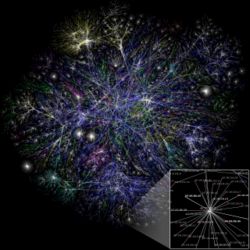Internet: Difference between revisions
imported>Subpagination Bot m (Add {{subpages}} and remove any categories (details)) |
imported>Ro Thorpe m (copyedit) |
||
| Line 3: | Line 3: | ||
[[Image:Internet map 1024.jpg|right|thumb|250px|A map graphically displaying interconnections on the Internet (known as [[Router|routes]])]] | [[Image:Internet map 1024.jpg|right|thumb|250px|A map graphically displaying interconnections on the Internet (known as [[Router|routes]])]] | ||
The '''Internet''' is a "network of [[computer network|networks]]" best known as the global network the [[World Wide Web]] is run on. Many people | The '''Internet''' is a "network of [[computer network|networks]]" best known as the global network the [[World Wide Web]] is run on. Many people call the "World Wide Web" "the Internet," but this is not accurate. The Web is the Internet's best known and front-facing service; however there are literally hundreds of different [[protocols]], applications and services that run over the Internet. | ||
The research which led to the Internet was funded initially by the United States' [[Defense Advanced Research Projects Agency]] (DARPA), which was established in 1958 as the first U.S. response to the Soviet launching of [[Sputnik]]<ref name="DARPA1">{{cite web|url=http://www.darpa.mil/body/overtheyears.html|title=Defense Advanced Research Projects Agency|publisher=United States government|year=2003|accessdate=2007-05-12}}</ref>. The first functional networks between individual computers were created in the early 1970s. Many educational institutions and corporations began joining the network, and in 1983 all nodes on the so-called ARPANET changed over at once to a new [[protocol]], TCP/IP, which is still in use on the internet today. The fundamental transport [[protocol]] for the internet has not changed substantially in more than twenty years. However, it is on the verge of being "upgraded" in the near future, with a movement from version 4 (IPv4) to version 6 (IPv6) of TCP/IP. | The research which led to the Internet was funded initially by the United States' [[Defense Advanced Research Projects Agency]] (DARPA), which was established in 1958 as the first U.S. response to the Soviet launching of [[Sputnik]]<ref name="DARPA1">{{cite web|url=http://www.darpa.mil/body/overtheyears.html|title=Defense Advanced Research Projects Agency|publisher=United States government|year=2003|accessdate=2007-05-12}}</ref>. The first functional networks between individual computers were created in the early 1970s. Many educational institutions and corporations began joining the network, and in 1983 all nodes on the so-called ARPANET changed over at once to a new [[protocol]], TCP/IP, which is still in use on the internet today. The fundamental transport [[protocol]] for the internet has not changed substantially in more than twenty years. However, it is on the verge of being "upgraded" in the near future, with a movement from version 4 (IPv4) to version 6 (IPv6) of TCP/IP. | ||
Revision as of 19:21, 6 January 2008

The Internet is a "network of networks" best known as the global network the World Wide Web is run on. Many people call the "World Wide Web" "the Internet," but this is not accurate. The Web is the Internet's best known and front-facing service; however there are literally hundreds of different protocols, applications and services that run over the Internet.
The research which led to the Internet was funded initially by the United States' Defense Advanced Research Projects Agency (DARPA), which was established in 1958 as the first U.S. response to the Soviet launching of Sputnik[1]. The first functional networks between individual computers were created in the early 1970s. Many educational institutions and corporations began joining the network, and in 1983 all nodes on the so-called ARPANET changed over at once to a new protocol, TCP/IP, which is still in use on the internet today. The fundamental transport protocol for the internet has not changed substantially in more than twenty years. However, it is on the verge of being "upgraded" in the near future, with a movement from version 4 (IPv4) to version 6 (IPv6) of TCP/IP.
History
1950s to 1970s
1975 to 1980
1980 to 1990
Impact on Society
External Links
- "History of the Internet" sites abound in various places on the Internet, as seen by this Google search
Related Topics
- The ARPANET was the Advanced Research Projects Agency network that evolved into today's Internet
- The article on Computer networks for a general overview of computer networking
References
- ↑ Defense Advanced Research Projects Agency. United States government (2003). Retrieved on 2007-05-12.